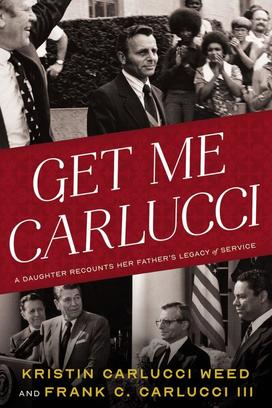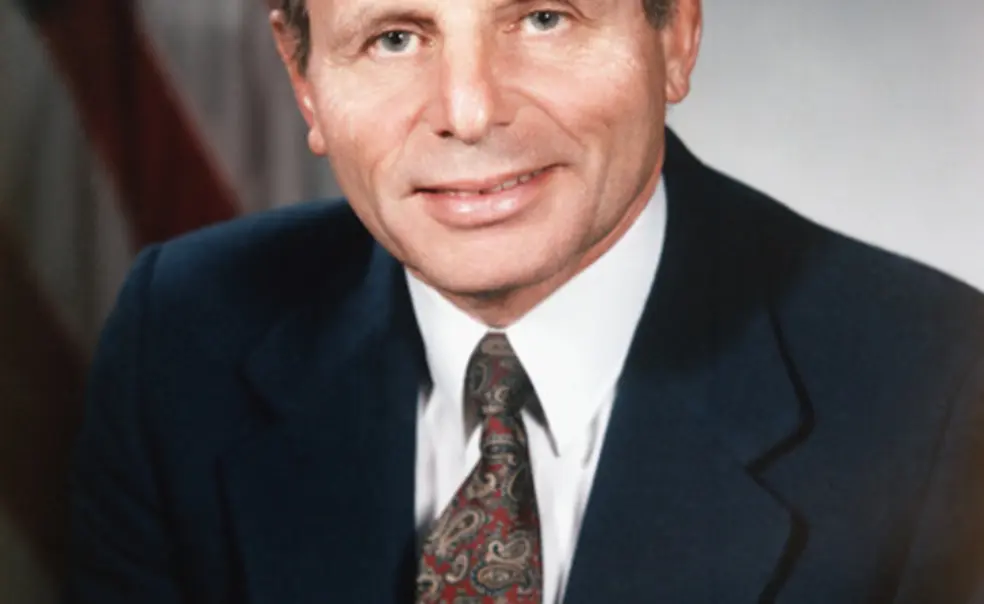Frank C. Carlucci ’52’s Daughter Honors Late Father’s Career In Service In New Book
The book: Frank C. Carlucci ’52 had an incredible career in government. He served under six presidents in a variety of roles, including secretary of defense, deputy director of the CIA, and as ambassador to Portugal. In Get me Carlucci (Disruption Books), his daughter Kristin Carlucci Weed picks up where he left off with his memoir to recount Carlucci’s story of service, hard work, and statesmanship. From Carlucci’s childhood to his military service and roles in government, the book offers an intimate account of a man who played a major part behind the scenes, and was admired by many.

The authors: Kristin Carlucci Weed is a graduate of Duke and Johns Hopkins, where she focused on international affairs and public policy. She spent years working in policy research in the U.S. and Europe, before settling down with her family in Washington, D.C.
Frank C. Carlucci III ’52 was an American politician and diplomat, who graduated from the Princeton School of Public and International Affairs. He served in a variety of government agencies including the Office of Economic Opportunity and the Central Intelligence Agency.
Excerpt:
Chapter One - Find a Way or Make One
MY FATHER HAD A lot of admirable qualities. Patience was not one of them. I have little doubt that my father’s tendency to move quickly and to always keep his eyes open and his feelings to himself had their origins in his upbringing.
My father, Frank Carlucci III, was born on October 18, 1930, in Scranton, Pennsylvania. His namesake, Frank C. Carlucci I, my great-grandfather, had come to Scranton from Santomenna, Salerno, Italy. He had been a stonecutter in the old country and, after arriving penniless, he worked his way up to become a successful stonemason. My father’s parents met at Lafayette College in Easton, Pennsylvania. Frank II was an insurance salesman and a proud businessman. He liked to harangue my father for not going into business — somewhat ironic given the fact that my father did in fact end up as one of the earliest partners of The Carlyle Group, now one of the largest private equity firms in the world, though that element of his career was not the one he dwelled on later in his life.
My father was not a reclusive child, but he was reserved. He’d spend long hours roaming the woods around the family’s cabin in Bear Creek, Pennsylvania. His sister, five years younger, was not much of a companion. When my father was ten or eleven, his parents divorced. I don’t know what transpired between my grandparents exactly, but divorce was not common at the time, and for Italian immigrants it was practically unheard of. Family ties, always strong in the old country, were now lifelines that kept new immigrants tethered to both their life in a new country and to the traditions and culture of their homeland. Given that my father’s family hailed from the region around Naples, where your famiglia determined your fate more than any other factor, the dissolution of his parents’ marriage must have had an effect on my father, his sister, and the extended family.
My father stayed near Scranton with his father, who married a woman named Ruth a few years after the divorce. My father recalled his relationship with his stepmother as warm, if somewhat distant. By the time she came into his life, he was a teenager, so she was never really a maternal figure to him. He never discussed it with me, but I believe these early experiences
had an impact in shaping his self-reliant and fiercely independent nature — and perhaps also on his decision to end his own first marriage when it was clear things weren’t working out and to move on as amicably as possible.
The Carlucci family was well known in the Scranton area because of my great-grandfather’s skill as a stonemason. Some of the buildings he worked on remain city landmarks, including several banks and churches, a county courthouse, a railroad station, and a post office. After arriving in Scranton in the mid-1880s, he began his own stone supply business, Carlucci & Bro., choosing a location close to the Delaware, Lackawanna & Western Railroad so materials from his quarries could be easily shipped around the country. The business was later renamed Carlucci Stone Co. 4. Interestingly, my great-grandfather was commissioned to construct the immigration station at Ellis Island, where he himself had passed through not long before. In an even more serendipitous turn of fate, he also was called upon to create the grand stairway at Arlington National Cemetery in Virginia. Little did he know his grandson would be buried there with full military honors after reaching one of the highest positions in the U.S. government.
By the time my father was growing up, his family was well established in the community, and behaving respectably was no small matter. If young Frank disobeyed, he could expect to be spanked. At the dinner table, his father would use their notoriously long meals as an opportunity to grill him. It was not unusual for the “talk” to get quite intense—and for young Frank to leave the table fighting tears. My father’s intense dislike for long dinners stayed with him for the rest of his life. He was often the first to finish, and the first ready to leave the table. Incidentally, he was also the first to arrive to the table, and most other places — he never wanted to be late for anything or keep anyone waiting.
My father lived near Bear Creek, where he would swim in the lake and explore the woods for hours. When he entered high school, he chose to attend Wyoming Seminary, a prep school in nearby Wilks-Barre, Pennsylvania. He excelled academically and athletically and was proud to be accepted to Princeton University. Dad may have been compromising for his short stature of just over five feet (judicious reports later gave him a height of five feet seven), but there was not an exercise, sport, or competitive game he did not like — and he excelled in several. He was a star wrestler on both Wyoming Seminary and Princeton’s wrestling teams and would later be initiated into the National Wrestling Hall of Fame. Princeton’s football team treasured him because he could slip through, under, or around others in tight spots where no one else fit: a “little stick of dynamite.”
All his life he biked, swam, and ran, and later in his life he played daily competitive tennis. It bothered me when my father would call me at college and ask: “How are your studies? Are you exercising?” Every time we spoke, I could expect these two questions. At the time I felt he was judging my choices and my weight. But now I know that what he was getting at was the idea of mens sana in corpore sano — the Latin phrase meaning “a healthy mind in a healthy body.” He certainly believed in it in his own life.
He knew that it was up to him to make the most of his Princeton education, and he did. He met his longtime friend and future colleague Donald Rumsfeld there, along with others who would shape the direction of his life. He studied at the Woodrow Wilson School of Public and International Affairs (now the Princeton School of Public and International Affairs), which surely influenced his desire to enter the Foreign Service.
He also had a few adventures in his college years, including spending a summer in Mexico. My Aunt Joan liked to tell a story about him coming home and dumping out a suitcase full of used shoes — his idea of a good souvenir — on the living room floor. Frank II was none too happy about it. During his sophomore year, my father came home for Thanksgiving break in a used car he had just bought. He was very proud and couldn’t wait to show it off. His father quizzed him on all the details of his purchase, including whether he had insurance to drive it. Frank sheepishly said no. His father then demanded, “Get that car out of here right now!” That’s how things often went between the two of them.
Another story from my father’s college years sticks with me, as it speaks volumes about the type of man he was. Princeton has no fraternities or sororities, but instead has eating clubs that students in their junior year can apply to join. He got into a coveted club but one of his best friends didn’t, so he turned down the membership and instead joined the club where his friend was accepted. His commitment to friendship was greater than his need for prestige. His loyalty, whether to a person or to a job he was tasked to perform, was a trait that held true throughout his life.
Excerpted from Get Me Carlucci by Kristin Carlucci Weed and Frank C. Carlucci III. Reprinted by permission of Disruption Books.
Reviews:
“Frank Carlucci is living proof to all of us and to the world that ‘only in America’ is more than just an easy cliché: it’s a great ringing truth.” — President Ronald Reagan
“Secretary Carlucci represented the best of Washington, and this book captures in his own words the legacy of great foreign policy and national security accomplishment he left behind.” — Stephen J. Hadley, former National Security Advisor












No responses yet